
Not all eye diseases and conditions have obvious symptoms when they begin. Cataracts, which can cause vision loss if left untreated, typically only cause mild problems at first. Being aware of these issues ensures you get the treatment you need as soon as possible.
What Symptoms Do Cataracts Cause in the Earliest Stages?
1. Increased Sensitivity to Light
Cataracts occur as proteins accumulate on the lenses of your eyes. This can lead to issues with bright lights, including light sensitivity. You may find yourself squinting on sunny days or being bothered by overhead lighting in your office. While some people may be more sensitive to bright lights than others, any sudden changes to your vision warrant an eye exam.
2. Problems Driving at Night
People with cataracts also experience issues in low light. Road lights and signage can appear to have halos or glows around them, making it difficult to see when driving. Oncoming headlights can also cause issues, which can make it dangerous to drive.
3. Cloudy Vision
 Sometimes, problems associated with cataracts begin small and grow larger over time. A small blurry or cloudy spot in your line of vision might not seem like a real issue at first. However, as your lens thickens over time, these small spots can become more significant until they impede your vision.
Sometimes, problems associated with cataracts begin small and grow larger over time. A small blurry or cloudy spot in your line of vision might not seem like a real issue at first. However, as your lens thickens over time, these small spots can become more significant until they impede your vision.
4. Faded or Discolored Vision
Along with cloudiness, also be on the lookout for discoloration. Colors may appear faded and less brilliant overall. You may also notice discolored spots in your vision, which can sometimes appear brown or yellow.
To get to the bottom of troublesome symptoms, visit an eye doctor. In Washington, MO, Comprehensive Eye Care is board-certified in ophthalmology and also offers more than three decades of experience when treating patients. Not only can they quickly diagnose eye disorders, but they also provide safe and effective solutions, including lens surgery to correct cataracts, laser procedures to correct refractive errors, and treatments to relieve eye pressure. Learn more online, and call (636) 390-3999 to schedule an appointment or sign up for clinical trials.
About the Business
Have a question? Ask the experts!
Send your question

